

I wasn't satisfied with the first couple of games that I had played on Civ5. The goal was to bump up the difficulty to Immortal, and see what happened there when the AI was given further bonuses. I picked Egypt, rolled a map, and got started.

This didn't look like the greatest starting position. No rivers, no tiles with food bonuses, and few hill tiles in the starting area. Still, I prefer to play the hand that the game deals you (instead of rerolling endlessly for the best starts), and this wasn't crippled or anything like that. Three happiness resources was a very good sign, between the ivory and spices and cotton. Now check out what else my settler has revealed: two barb camps immediately in range of my starting position! There was actually a third one just to the east of that lake as well, so three full barb camps in the immediate vicinity. Yikes! You get no grace period whatsoever on Immortal difficulty.
My first build was a scout, followed by a worker, in what seems to be a very standard opening for this game. I needed that scout for some combat help in dispelling the barb camps, and I also wanted a chance to snag more of the goody hut bonuses, which are very powerful in Civ5. I would end up popping about five or six of the huts, most notably finding Bronze Working tech and getting my initial warrior upgraded to a spearman. I did not find the +1 population bonus though, which is the most powerful one. Popping tech really isn't that great in my experience, because in Civ5 you always seem to have vastly more technology than you can actually use, due to the slow production in the early game. Overall, it was a pretty successful early game from a scouting perspective.
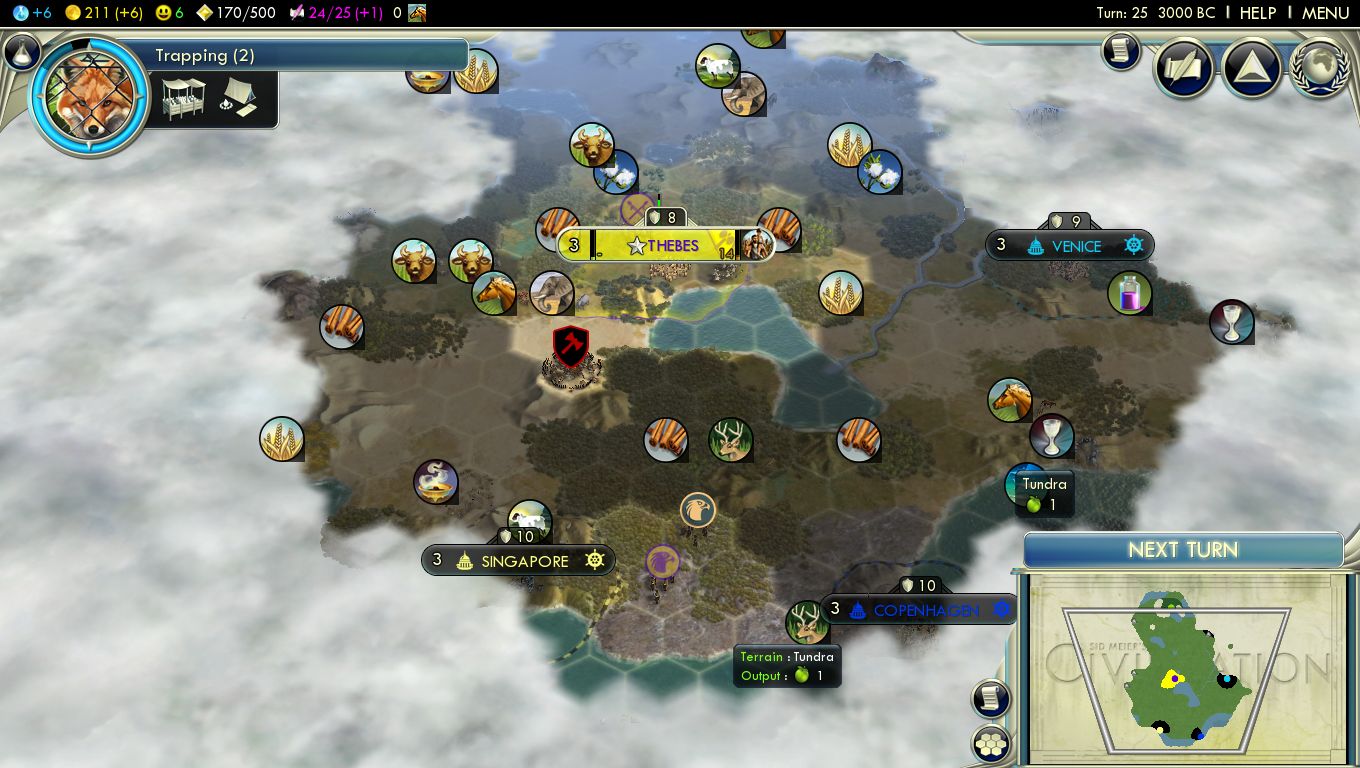
Here's the immediate starting vicinity after 25 turns of exploration. I was playing on the Oval map script, a new one that creates a Pangaea landmass with various bays and inlets jutting into the larger landmass. While I didn't find it to be that much different from a standard Pangaea, I like having the additional option for some variety. On the minimap, I have found Arabia to the north in a desert region (to be expected, given their start bias preferences), and hit the jackpot in finding three Maritime city states to my east and south. Outstanding! I couldn't have asked for better luck there, and the vagaries of the map can really help or hurt you in that regard. (Sucks to be the poor sap who finds himself on a landmass with no Maritime city states in this game.) I saw units from other civilizations walking around, Iroquois and Siam and America, however I didn't know where they were located. Eventually I would discover that I was on the western edge of the Oval, and the other four civs were all located off to the east. Just me and Arabia here on the western side, along with a whole bunch of city states.
My spearman upgrade dispelled quite a few barb camps, but I couldn't get the one to the south of Thebes, which was defended by a barb spearman fortified on top of a hill. The simplest solution would be training an archer or ranged unit to bombard the unit over time. Then again, that would tie up my capital on many turns of valuable early production, not what I wanted. Here's another trick I've discovered:

The barbarian AI is very easily baitable in this game. If you dangle a worker in front of them, they will always take it. By moving my worker onto the ivory tile, I could bait the enemy spear into moving onto the same tile, them bombard the unit from Thebes and clean up with my own spear, recapturing the worker immediately back. Scout walks into empty barbarian camp. I haven't tried this with the enemy civs yet, but my guess is that you can probably bait them the same way, and since neither barbs nor the other civs appear to disband captured workers, you can keep reclaiming your own lost units endlessly. It might even be a good idea to take workers along with you on military campaigns, specifically as bait to destroy enemy units, given the huge -33% penalty when defending on flat terrain. Not the most tactically adept AI in this game...
My first settler went off to the east, into a nice river region with tons of food but little production. It was still some of the best land in the region, and by now I had realized that the land to my west was relatively safe, meaning early expansion should head in the opposite direction. Next I had Thebes train a second worker, followed by a second settler, my three luxuries serving as enough to keep me happy for the moment. I still had just the two military units, a spearman and a scout, which together were fogbusting and keeping my cities safe from barbarians. I was pleased to see in the rankings that I was only slightly behind the AI civs in tech (I had 7 techs, the AI leaders had 10) given their major bonuses and free starting techs. They all get 3 techs to start the game on Immortal, thus I was keeping parity so far!
The biggest change from my previous Emperor game lay in the realm of trading and diplomacy. With more and more practice in Civ5, I was beginning to open up this part of the gameplay and see how malleable it can be. First of all, I dispelled yet another barbarian camp that sprang up south of Memphis:

One thing I don't like about this game are the new sight rules: I could not spot that barb camp from the cultural borders of Memphis itself. The wheat tile in my cultural control did not see the camp. But when I moved a unit onto the wheat tile, suddenly the camp became visibile. In Civ4, every tile you control culturally functions as though a unit were standing on that tile: nice and simple. Sight does not work that way in Civ5, and units see further than your own borders even when on the same tile. I know that this sounds minor and nitpicky, but it's a confusing game mechanic that doesn't make much sense intuitively. Why exactly was this changed again (?)
Anyway, I dispersed the camp and claimed the reward gold. Now check out that city state message on the right side of the screen. The Maritime city state of Copenhagen had requested that the camp be cleared, and thus I received a massive influx of 50 influence with that city state for a fairly trivial task that I would have done anyway. (50 influence is worth about ~400 gold, or something like forty turns of my current income. This for completing a mission that gets randomly assigned by city states! I really, really dislike how much random luck is involved in befriending the city states, because the benefits you receive are enormously important.) Now I have 50 influence with Copenhagen, and that allows me to start playing the great trading game. I can take my one luxury connected thus far, ivory, and sell it to the AI for cash:

He'll pay 300 gold for my ivory, an immense sum of money at this stage in the game, worth about 30 turns worth of my current income. (I do not fear the ivory helping the AI economically, because they aren't playing the same game as the human on this difficulty level. More on this later on, as you'll see.) From what I've seen thus far, you should sell your luxuries to the AI constantly in this game, every 30 turns, especially if you have extra sources lying around. Strangely though, you can only have one outgoing luxury of each type. I later had three sources of ivory, and after trading one source away to an AI, I could not send away my other excess luxury to anyone else. Not that the game tells you this anywhere, or provides any feedback on what's going on! So you can only sell each luxury one time, but you might as well keep doing it over and over again, since that gold is precious in the early game.
Note that you can also collect the AI's gold, then immediately declare war and break the deal, though you will suffer a reputation hit. Hey look, the Civ3 exploits are all back again, ummm, yay... 

Now with the gold I've received from Hiawatha, I can dump out a lump sum payment of 500 gold to Copenhagen, buying myself 75 more influence for a grand total of 125. This takes me to "Allied" status with Copenhagen, so they will happily hand over their pearls luxury to me, thus neatly restoring the happiness I lost by selling my ivory to Hiawatha. In other words, I've broken even on happiness, I made 300 gold and paid 500 for a total net loss of 200g, and in return I am guaranteed magical maritime food for the next 65 turns (!) which will explode my growth curve upwards. Just in my capital alone, that maritime bonus is worth 260 food, and with other cities factored in the total bonus should be well over 500 total food. For a payout of 200 gold. Yeah.
This is the new tech trading; you no longer can broker technologies around, but you sure can exploit luxuries into gold into maritime food. (Or culture/military units, if for some reason you want those things instead.) I don't like playing the game this particular way - I don't think it's much fun, and the maritime food undermines the necessity of selecting good city locations. Your cities literally don't have to feed themselves, and the ideal spots are actually these hilly regions with lots of mining potential. It's very, very weird... I have trouble believing the designers actually intended you to play the game this way. Sadly, trading for gold and then exploiting magical maritime food is overwhelmingly the strongest strategy at present, so much so that it crushes any other economic plan. The only other strong opening I've seen is the cheese Ancient Age rush with Greece or Rome, which isn't exactly conducive to good gameplay either.
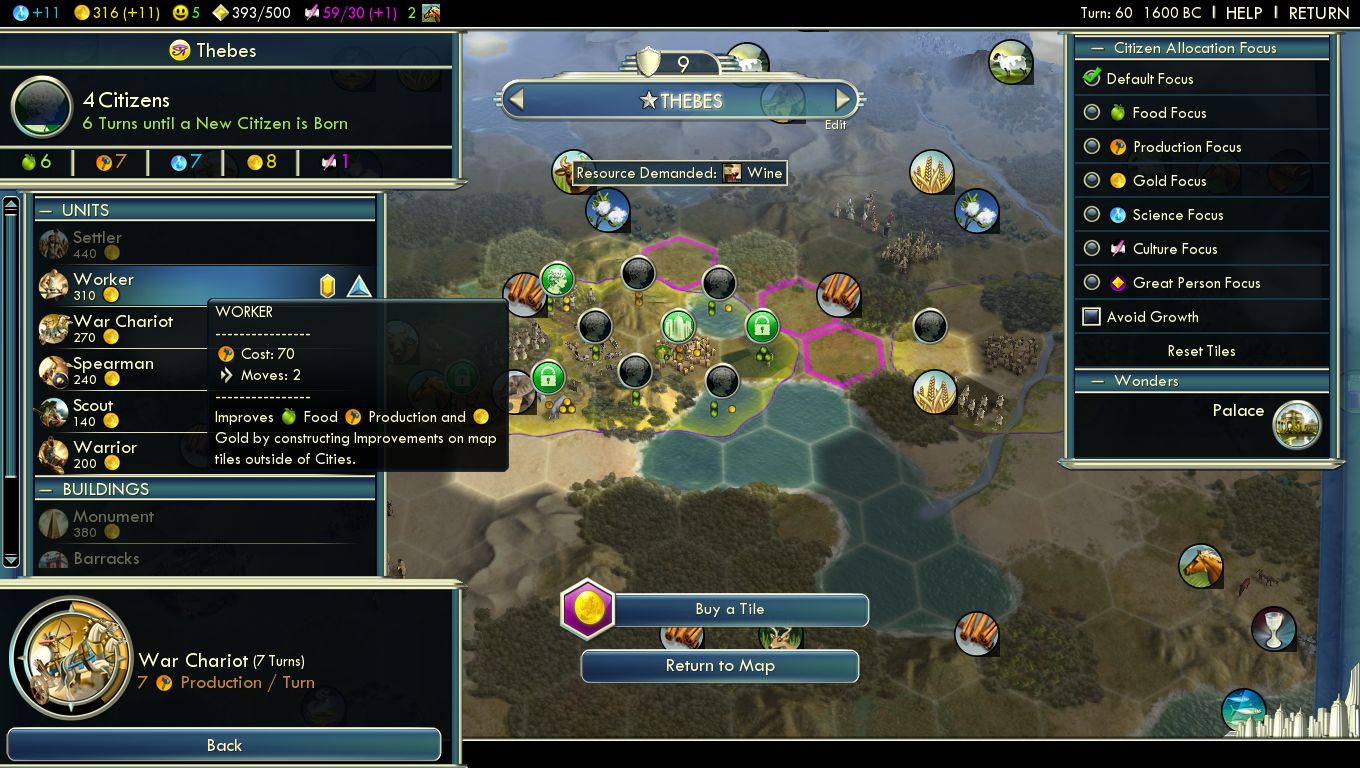
So here I am in the capital, which is already up to 6 food on the center tile from my alliance with Copenhagen. (Build a granary? LOL  I would never build a single granary or watermill the whole game. Completely useless, due to maritime food.) Here I used the rest of my excess income to purchase a third worker, at the pricey sum of 310 gold. I really needed that worker badly, and I decided to take worker steals off the table for this game, given how unbelievably cheesy that tactic can be. Worker labor itself is so strange in Civ5, as you'll find yourself desperately racing to improve tiles in the first 100 turns... and then after about Turn 150 or so, half your workers are standing around uselessly with nothing to do, because your cities grow unbelievably slowly after about size 10. That continues to feel "off", for lack of a better word.
I would never build a single granary or watermill the whole game. Completely useless, due to maritime food.) Here I used the rest of my excess income to purchase a third worker, at the pricey sum of 310 gold. I really needed that worker badly, and I decided to take worker steals off the table for this game, given how unbelievably cheesy that tactic can be. Worker labor itself is so strange in Civ5, as you'll find yourself desperately racing to improve tiles in the first 100 turns... and then after about Turn 150 or so, half your workers are standing around uselessly with nothing to do, because your cities grow unbelievably slowly after about size 10. That continues to feel "off", for lack of a better word.
I continued selling my luxuries whenever they were available. Once I had Calendar tech and spices connected for trade, I sold them to Washington for 300 gold, effectively paying for that worker buy. Definitely a good trade, sending away happiness I didn't need for a desperately desired worker. I soon received another mission from a different Maritime city state to destroy a barb encampment, which I did, and reaped another free 50 influence. I would purchase more influence on top of that for a second Allied maritime state, getting back whales in return. Now I had my own two luxuries outgoing to other civs for cash payments, while my own economy was running off two gifted luxuries from city states. Precarious indeed, but if you can pull it off...

More AI idiocy. Arabia has been attacking Vienna for the last 15 turns; the two damaged units above are from the two of them fighting one another. They sign peace, and then on the first turn of the peace, Harun immediately announces that he's protecting Vienna. Needless to say, the AI looked completely absurd here. The other AIs weren't exactly covering themselves in glory either, as there was one turn where they all asked me for Open Borders at once. Yeah, four straight Open Border requests, one after another! Either that's a huge coincidence, or there's some really weird stuff going on under the hood. I was continuously deluded with requests for Pacts of Cooperation and Pacts of Secrecy, most of which I agreed to. What does all this stuff really mean? Does it mean anything? The lack of feedback on what effects your choices have can be maddening. I know that eventually players are going to crack this system, and dig out what's actually going on from the code... but players shouldn't have to do that, in my opinion, and in the meantime the whole process is really frustrating.
Anyway, now I had two Maritime allies, and the free food began to flow like crap from a force-fed goose:
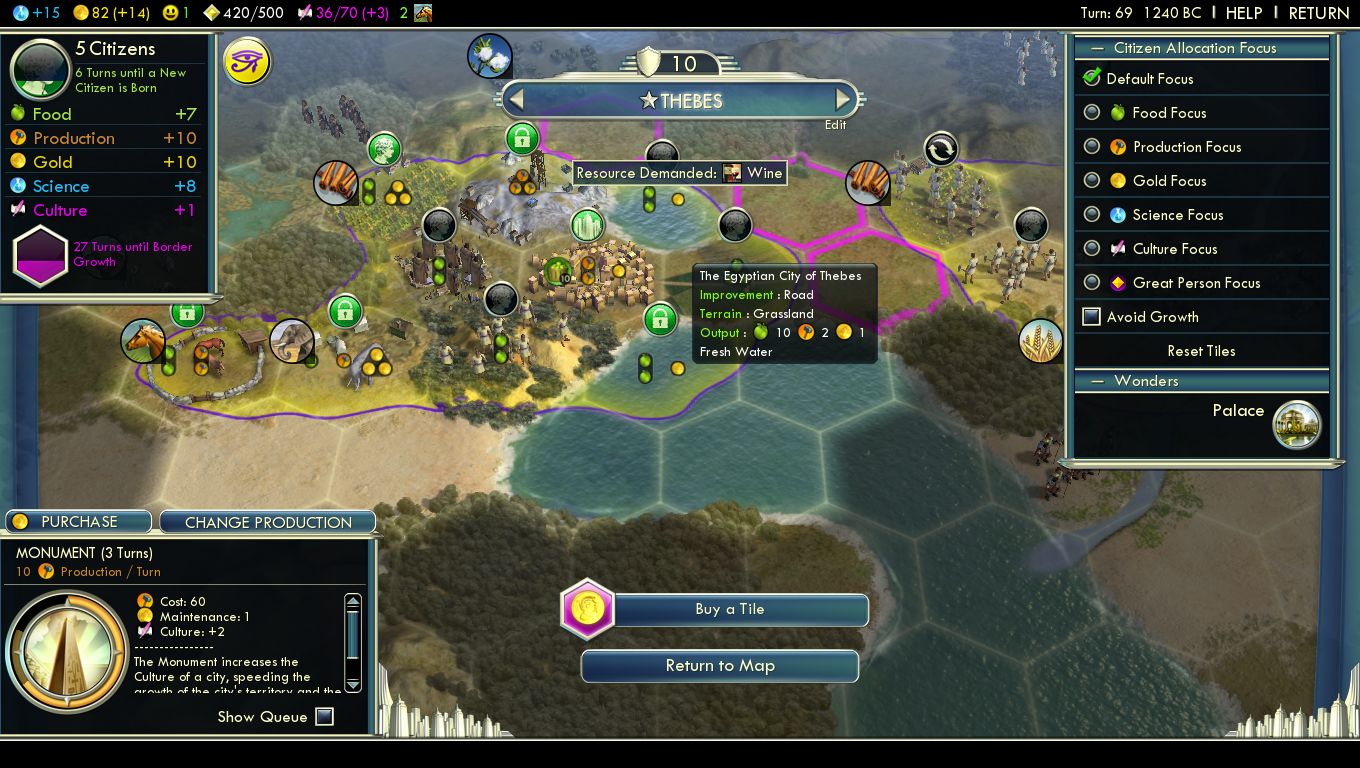
Thebes gets 10 food/turn on the center tile; all other tiles together produce 7 food. It's just like the corporations in Civ4, only now you can get the benefits at the very early stages of the game. I disliked the corporations in Civ4 because they quickly became a "One Right Strategy" for the lategame - the guy running Sid's Sushi will always outperform the guy who doesn't - and I'm very concerned that the same thing is happening in Civ5. Elsewhere, notice that I'm finally completing my first city improvement in the capital, a monument, which still takes 6 turns even with all this extra production. Obviously a granary, which costs 100 shields/10 turns, is out of the question here.
In terms of social policies, I've seen most people taking the Honor tree early on. That tree is great for fighting, but if you're playing on high difficulty and not going for the early rush, I think the social policies are better spent elsewhere. For this game, I skipped the first three trees entirely and placed my first point in Piety. That +2 happiness is a decent benefit on its own, and some of the other policies are key, particularly the one that subtracts 20% of unhappiness from population. And of course the last social policy in Piety grants two free policies, making this a very strong tree to complete. After the one point in Piety, I placed my next two two points into Patronage, for the initial policy (influence degrades 25% slower) and Philanthropy (25% more influence from gold gifts). With just those two points, it's incredibly easy to keep city states pacified; luxury sales alone should be enough to keep 2-3 city states permanently in allied status. 500 gold grants you something like 87 influence, which degrades at 0.75 per turn, for a grand total of something like 116 turns of benefit. Easy peazy. (I don't even want to think about playing as Siam or Greece!)

What do you do with all that maritime food in cities without much production? Turn them into specialists, especially scientist specialists. Libraries are cheap and are pretty much the one improvement that should go in every city. A location like Memphis should have no trouble running 2 scientists and still be able to keep growing upwards. (Just wait until I have Civil Service here!) This is also a reason why I think the Great Library is a bit of a sucker's build. Instead of tying up that precious early production on a wonder, for a single free technology, just set one of your cities with a library onto two scientist specialists. With maritime food, you're not even paying a penalty, and you'll have your Great Scientist for a free Civil Service tech in 17 turns. Seems to work well for me, in my admittedly limited experience thus far.
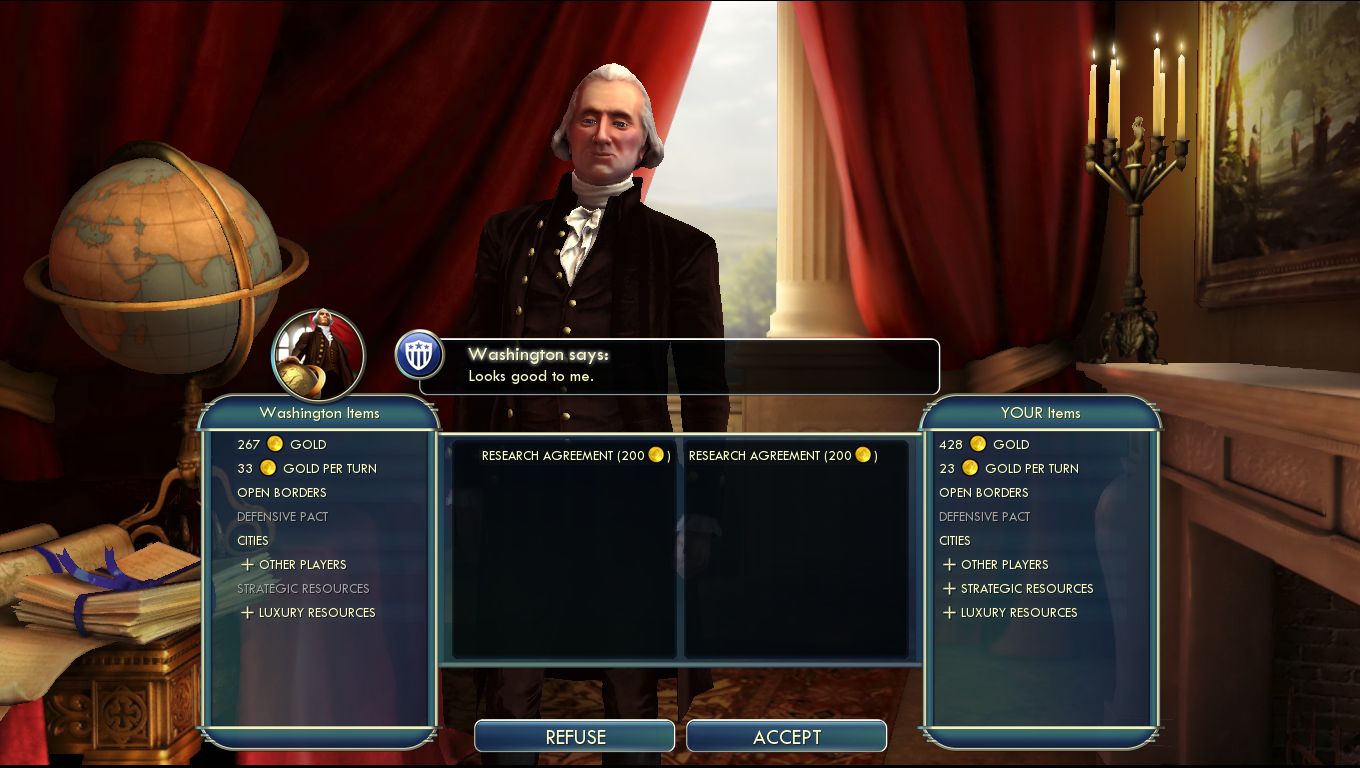
Some of the AIs came asking for Research Agreements, and I agreed to sign a few of them. This is another one of those ideas that's really cool in theory, and rather lacking in execution. Both sides pay a certain amout upfront, and 30 turns later, they both receive a free technology. Neat, but again pretty exploitable (sign the agreements with backwards AIs that are not a threat) and receiving a random technology doesn't feel like the best implementation. Some kind of a boost to science would have been nicer than a random technology, I think. Maybe too hard to code?
Soon enough my Great Scientist pops at Memphis:

Which I use for Civil Service tech, as previously mentioned. I was actually already in the Medieval era, but conceivably you could use this slingshot for access to the Patronage social tree at an early date. I know I've seen people doing that with the Great Library. Anyway, I was in a Golden Age at the time from excess happiness, and I waited until that wore off to get a fair assessment of where I stood 100 turns into the game. Here's the map:
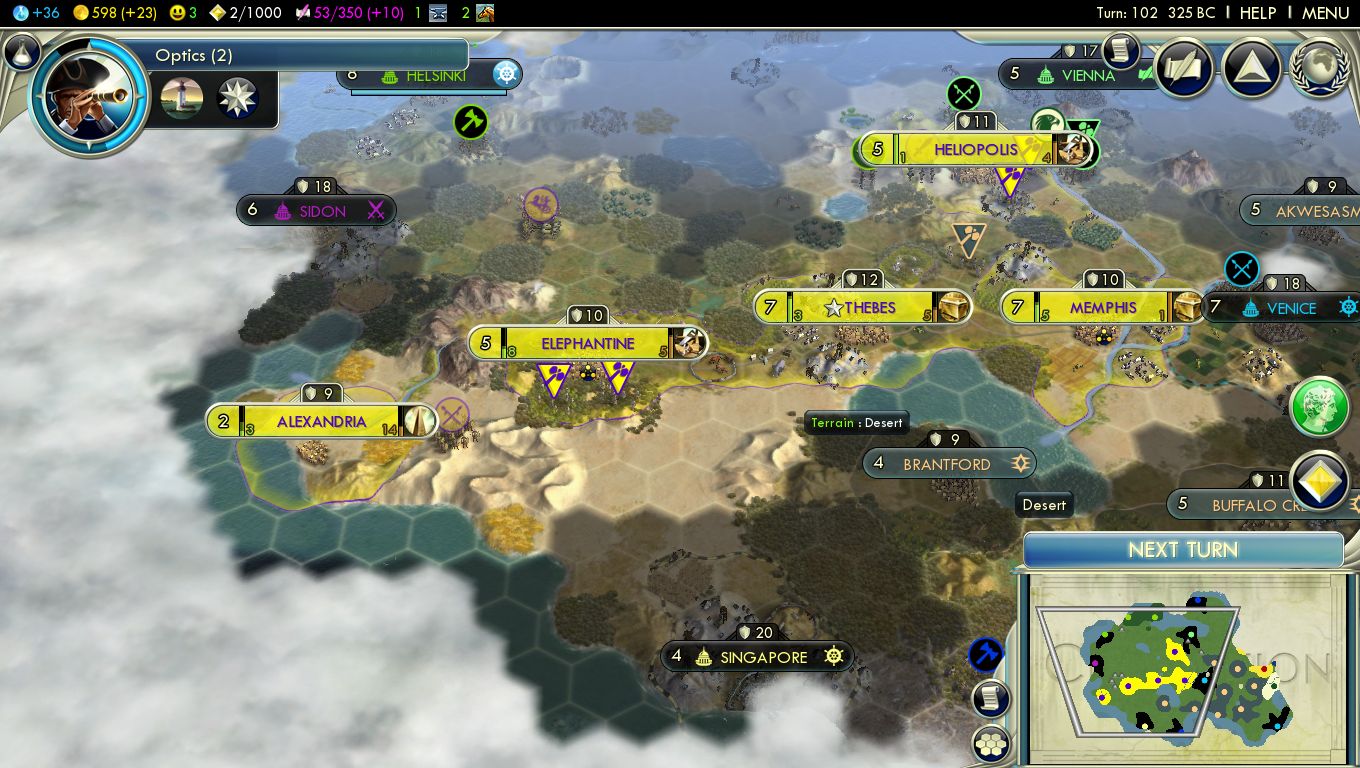
I've managed to reach five cities of pretty good size, and have expanded in such a way that there's still a secure backlines for more future cities. Science and especially gold look to be in decent shape, thanks to Memphis providing so many trading posts in its river location. Heliopolis and Elephantine are both production cities with lots of hills, while Alexandria is my only coastal city, and has a river location akin to Memphis. Looks like another trading post gold city. Nice overall balance between my cities.
Comparing with the AIs:
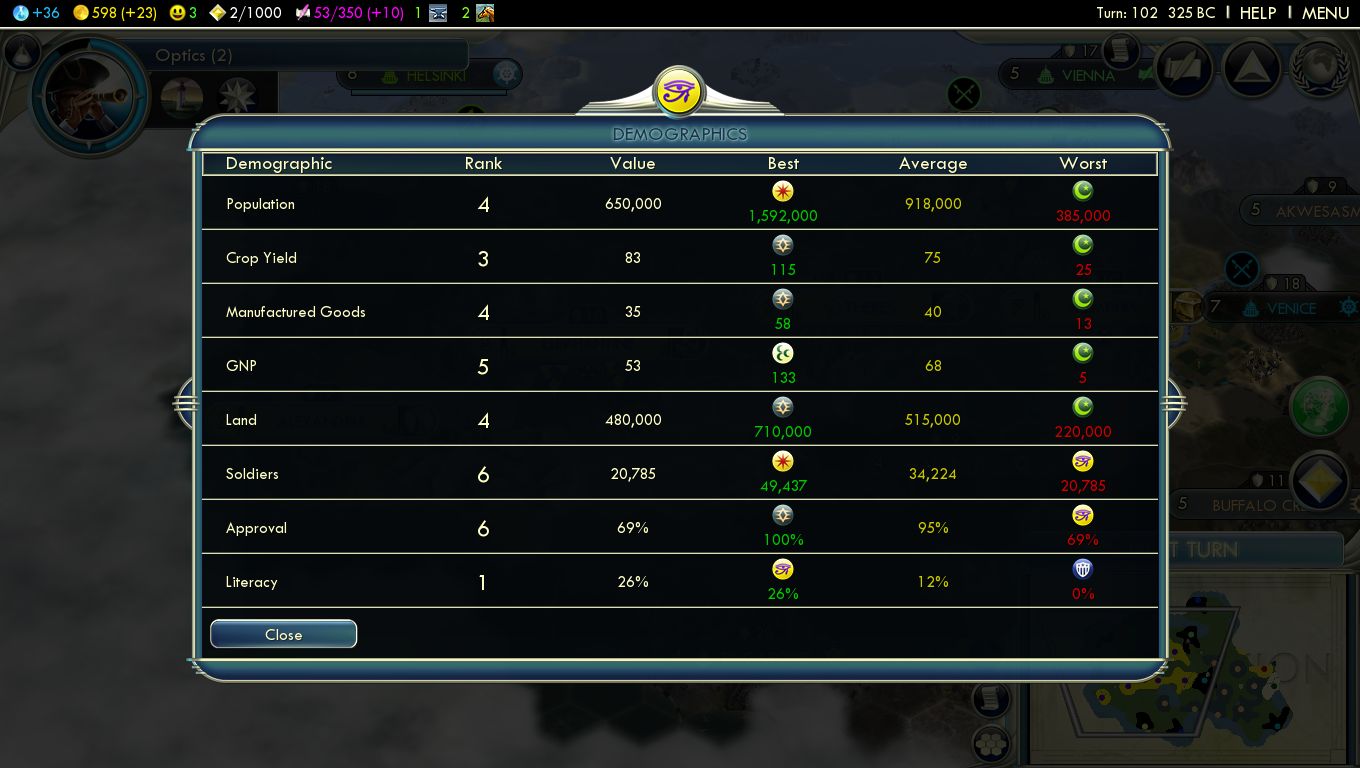
Wow.  The AI actually has given me a challenge for the first time ever in Civ5. On all previous difficulties, the game was effectively finished at this point, with the AI just rolling over and being unable to cope with my early expansion. I'm no better than the middle of the pack right now, ahead of Arabia and roughly even with America/Ottomans. The Iroquois and Siam are the big dogs in this game. Even with all my maritime food, the Iroquois are signficantly ahead in Crop Yield. I'm proud of my five cities, and I don't think I could have expanded much further than this in 100 turns. And yet Hiawatha has eight cities already, which are larger cities than mine! It seems the AI benefits on Immortal are nothing to trifle with.
The AI actually has given me a challenge for the first time ever in Civ5. On all previous difficulties, the game was effectively finished at this point, with the AI just rolling over and being unable to cope with my early expansion. I'm no better than the middle of the pack right now, ahead of Arabia and roughly even with America/Ottomans. The Iroquois and Siam are the big dogs in this game. Even with all my maritime food, the Iroquois are signficantly ahead in Crop Yield. I'm proud of my five cities, and I don't think I could have expanded much further than this in 100 turns. And yet Hiawatha has eight cities already, which are larger cities than mine! It seems the AI benefits on Immortal are nothing to trifle with.
Well, we finally have a game on our hands, as the AI's brute force bonuses have turned it into a capable challenger. Let's see how things go in the next 100 turns.



